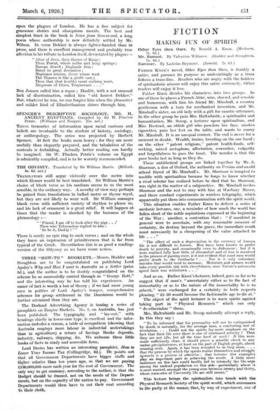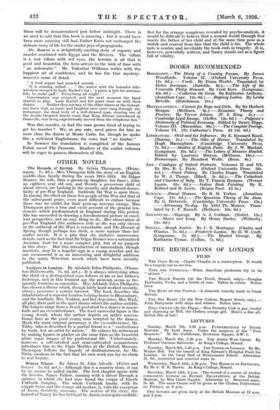FICTION
MAKING FUN OF SPIRITS
Summer. By Ladislas Reymont. (Jerrold. 7s. 6d.) FATHER KNox's novel, Other Eyes than Ours, is frankly a satire, and pursues its purpose as undeviatingly as a tram follows a tram-line. Readers who are angry with the holders of spiritualistic seances will enjoy this satire extremely. Other readers will enjoy it less.
Father Knox divides his characters into two groups. In one of these he places a French Abbe, wise, shrewd, and sensible and humorous, with him his friend Mr. Minshull, a country gentleman with a turn for mechanical invention, and Mr. Minshull's sister, an old lady with a gift for caustic utterance. In the other group he puts Mrs. Haltwhistle, a spiritualist and humanitarian, Mr. Scoop, a lecturer upon spiritualism, and Miss Rostead, an oldish girl who powders her face, smokes cigarettes, puts her feet on the table, and wants to marry Mr. Minshull. It is an unequal contest. The end is never for a moment in doubt. Wealth, brains, breeding on the one hand ; on the other " patent religions," patent health-foods, self- seeking, mixed metaphors, affectation, cowardice, vulgarity and forgetfulness to pass the toast. The wonder is that the poor boobs last as long as they do.
These antithetical groups are linked together by Mr...S. Shurmur, a don of Oxford, the authority on Persius and an old school friend of Mr. Minshull's. Mr. Shurmur is tempted to meddle with spiritualism because he longs to know whether a rival scholar has realized before he died that he, Shurmur, was right in the matter of a subjunctive. Mr. Minshull invites Shurmur and the rest to stay with him at Warbury Manor, and there conduct experiments in wireless telegraphy, which apparently put them into communication with the spirit world.
This situation enables Father Knox to deliver a series of sardonic lectures, one, a reminder of how much the world has fallen short of the noble aspirations expressed at the beginning of the War ; another, a contention that : " if mankind in general were to ascertain, with any reasonable measure of certainty, its destiny beyond the grave, the immediate result must necessarily be a cheapening of the value attached to life . . . "
" The effect of such a depreciation in the currency of human life is not difficult to foresee. Mon have been known to prefer death to poverty, and occasionally oven to dishonour ; but if it were realized fully how little of discomfort and of loss is involved in the process of passing over, is it not evident that most men would prefer death to the toothache ? . . . Nor is it only voluntary suicides that would tend to increase. Motorists and airmen would take every possible risk with cheerfulness, once Nature's automatic speed limit was withdrawn . . ."
And so on. Father Knox's lecturer, indeed, goes so far as to suggest that if man's " uncertainty either as to the fact of immortality or as to the nature of the immortality he is to inherit," were exchanged for a certainty in both respects pleasing, " 25-30 would become the fashionable age to die at."
The object of the spirit lecturer is to warn spirits against taking part in " Physical Research " which can only " de-etherialize " them.
Mrs. Haltwhistle and Mr. Scoop naturally attempt a reply, In this they say : " To be informed that his personality will not be extinguished by death is naturally, for the average man, a comforting sort of revelation.. . . Could not the spirits lay more emphasis on the fact that their life over there is one of continued activity ? That they are not idle, but all the time hard at work ? If this were made sufficiently clear, it should prove a sensible check to any undue precipitateness, at least on the part of English people, about crossing over. Again, it has been revealed to us long since, . . . that the process by which the spirits realize themselves and struggle upwards is a process of education : that lectures (for example ) Ow an important part in achieving the result. A little more insistence on this fact could hardly fail to intensify the life-urge among the undead population on this side—particularly where it is moat wanted, amongst the young men between twenty and thirty, whose memories of University life are 801 recent."
This lecture brings the spiritualists into touch with the Physical Research Society of the spirit world, which announces to the party at the manor, that, by way of experiment, one of theM will be dematerialized just before midnight. There is no need to add that this book is amusing ; but it would have been more amusing still had Father Knox not exchanged th3 delicate irony of life for the cruder joys of propaganda.
Mr. Rantosi is a delightfully exciting story of roguery, and murder combined with Egypt and the Riviera. The villain is a real villain with red eyes, the heroine is all that is good and beautiful, the hero arrives in the nick of time with " an automatic." Mr. Valentine Williams writes with the happiest air of confidence, and he has the true mystery- weaver's sense of detail.
" A loud report had sounded outside . . .
! It is nozzing, miladi . . . the waiter with the toreador side- whiskers stooped to Lady Rachel's ear ; a pneu, a tyre for automo- bile, he make pall ! Everything all raight ! ' . . Conversation was resumed, and the next moment the band started to play. Lady Rachel and her guest went on with their dinner. . . . Neither they nor any of the other diners at the restaur- ant knew that, as music and laughter once more rang through the restaurant, the dead body of a well-dressed man, wearing one of the double-breasted dinner coats that King Alfonlio introduced at Deauville, was being expeditiously moved from the telephone box."
Was this murder, or had the man grown tired of trying to get his number ? We, at any rate, need grieve for him no more than the diners at Monte Carlo, for, though he spoke like a well-bred Englishman, his voice had " no timbre.". In Summer the translation is completed of the famous Polish novel The Peasants. Readers of the earlier volumes will be eager to possess themselves of this.







































































 Previous page
Previous page